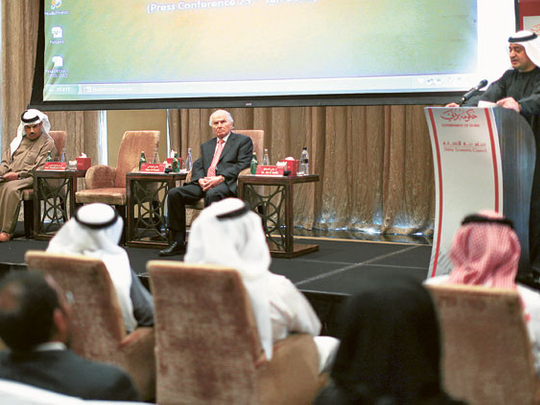
Dubai: Dubai's GDP is expected to grow 4.1 per cent in the first quarter of this year, according to the Dubai Economic Outlook 2011 report released by the Dubai Economic Council yesterday.
However, the report also suggested that GDP growth might decline as the year wears on. Abdul Razak Al Faris, chief economist and CEO of research at the Dubai Economic Council, said any such decline would be brought on by an economic slowdown in Dubai's trade partners such as the EU members, China, India and other GCC states.
In anticipation of continued expansion in the global economy, real GDP is expected to grow through the first quarter of 2012.
The lowest estimated growth rate — about 3.5 per cent — was attributed to the third quarter of 2011 followed by an increase of 5 per cent in the fourth quarter, he said.
While Dubai recorded an inflation rate of zero in the fourth quarter of 2011, inflation is expected to rise to 1.5 per cent in the first quarter of 2012, according to the report.
Al Faris observed that European sovereign funds and the consequences of the euro's decline and the dollar's gains as well as the stable cash flow in the local market were the main factors that would keep inflation at 1.5 per cent.
The main objective of the report is to provide the latest economic data and information about developments taking place at a macroeconomic level and across a number of econ-omic sectors.
"This information is analysed to help the executives of private companies in making rational investment decisions, which eventually enhance the economic growth of the emirate," said Al Faris.
Foreign trade
In his address, Hani Al Hamli, secretary-general of the Dubai Economic Council, said: "Dubai has witnessed great economic expansion in 2010 and 2011, showing a remarkable improvement across all business sectors in the market."
Moreover, with the good performance of foreign trade in addition to the economic, logistics and tourism sectors, Dubai is expected to record steady growth through 2012, al Hamli added.
Touching on the challenges ahead, he said: "There are a lot of internal and external challenges in front of Dubai which should be overcome to enhance its role as a key player not only at a regional level but globally."
According to the report, it is estimated that the fiscal deficit in Dubai will continue to decline in 2012.
The budget deficit declined from 4.3 per cent of Dubai's GDP in 2009 to less than 2 per cent in 2010 as a result of the rationalisation of expenditures.
It is pertinent to note that, historically, the share of public expenditure to GDP in Dubai has been low, and did not exceed 10 per cent even in the post-crisis year of 2010, when most governments raised expenditure in response to the global economic crisis.
This compares favourably with expenditure in Jordan of 30 per cent, 22 per cent in Qatar, 29 per cent in Bahrain, 20 per cent in Singapore, and 21 per cent in Hong Kong, according to the report.
Economic costs
Moreover, Dr Al Faris said that the structure of economic costs in the Government of Dubai shows that about two-thirds of total expenditures were allocated to 2011 current expenditures.
"The structure shows that revenue from corporate tax and duties dominated at 77 per cent in 2011, and revenues from fees and fines account for the largest share of non-tax revenues at 62 per cent. Customs revenue dominates the structure of tax revenues with a share of about 86 per cent in 2011," he added.
The real estate sector is seen contracting in the third and fourth quarters of 2011, with the expectation of a rise in the number and value of deals in the first quarter of 2012.
Chairman of the Dubai Economic Council Juma Al Majid observed: "Under the pressure of the developers in Dubai, banks were too excessive in their finance policy which led to the current real estate crisis. Banks should go back to the rules and regulations."
Real estate sector
The report noted that, in the first quarter of 2011, the real estate sector witnessed a reduction in apartment deals and transaction values, as well as stability in average price per square foot compared to the first quarter of 2010.
Transactions
The Dubai Marina area ranked first both in terms of number of deals and transaction value.
Transactions by UAE nationals, besides Pakistani and American traders, increased in volume in the first quarter of 2011 compared to the corresponding quarter 2010.
Conversely, transactions by Indian, Iranian and British traders declined for the same period. The contraction in the real estate sector continued in the second quarter of 2011 (from the first quarter of 2011 and also compared to the second quarter of 2010).
f












